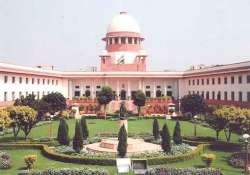Indian courts settle over 35 lakh cases in a single day
New Delhi: A National Lok Adalat, held simultaneously in the Supreme Court and courts across the country, Saturday settled over 35 lakh of the 39 lakh pending cases concerning accident claims, matrimonial disputes, dud cheques

New Delhi: A National Lok Adalat, held simultaneously in the Supreme Court and courts across the country, Saturday settled over 35 lakh of the 39 lakh pending cases concerning accident claims, matrimonial disputes, dud cheques and traffic fines, among others.
The mammoth exercise was undertaken in the day-long Adalat, inaugurated by Chief Justice P. Sathasivam, to deal with pending cases relating to motor accident claims, matrimonial disputes, labour disputes, dud cheques, bank recovery cases, civil suits and traffic tickets.
This was the first time that cases were taken up simultaneously all over the country for settlement.
Organised by the National Legal Services Authority (NALSA) and the Supreme Court Legal Services Committee, the Lok Adalats took place in the apex court, all 24 high courts and all the district and sub-district courts of the country.
As many as 35,10,390 cases had been settled, according to figures from the apex court.
In the Supreme Court, out of the 107 cases that were taken up for amicable settlement by three courts, 51 cases were settled.
Inaugurating the National Lok Adalat, Chief Justice Sathasivam had said that the main object of the adalat was to ensure speedy justice to litigants and make sure that there were no further appeals.
He described the resolution of disputes through the Lok Adalat as cost-effective, and also providing easy access to justice.
The chief justice urged the presiding judges to ensure that parties to the settlement of the cases are not intimidated or compromised while arriving at a settlement. He cautioned that Lok Adalats should not be allowed to be used by unscrupulous elements, who defraud people.
Of the 39 lakh cases that were taken up by different Lok Adalats all over the country, 7,94,484 were in Madhya Pradesh, 5,66,102 in Maharashtra, and about four lakh cases each in Uttar Pradesh and Tamil Nadu.
Three lakh cases were before the courts in Delhi, of which 273,000 were related to dud cheques.
NALSA chairman Justice G.S. Singhvi, who had initiated the move for the convening of the National Lok Adalat, said: "Lok Adalats or mediation is one of the most powerful instruments in speedy justice, which conforms to the goals of the preamble of the constitution."
The mammoth exercise was undertaken in the day-long Adalat, inaugurated by Chief Justice P. Sathasivam, to deal with pending cases relating to motor accident claims, matrimonial disputes, labour disputes, dud cheques, bank recovery cases, civil suits and traffic tickets.
This was the first time that cases were taken up simultaneously all over the country for settlement.
Organised by the National Legal Services Authority (NALSA) and the Supreme Court Legal Services Committee, the Lok Adalats took place in the apex court, all 24 high courts and all the district and sub-district courts of the country.
As many as 35,10,390 cases had been settled, according to figures from the apex court.
In the Supreme Court, out of the 107 cases that were taken up for amicable settlement by three courts, 51 cases were settled.
Inaugurating the National Lok Adalat, Chief Justice Sathasivam had said that the main object of the adalat was to ensure speedy justice to litigants and make sure that there were no further appeals.
He described the resolution of disputes through the Lok Adalat as cost-effective, and also providing easy access to justice.
The chief justice urged the presiding judges to ensure that parties to the settlement of the cases are not intimidated or compromised while arriving at a settlement. He cautioned that Lok Adalats should not be allowed to be used by unscrupulous elements, who defraud people.
Of the 39 lakh cases that were taken up by different Lok Adalats all over the country, 7,94,484 were in Madhya Pradesh, 5,66,102 in Maharashtra, and about four lakh cases each in Uttar Pradesh and Tamil Nadu.
Three lakh cases were before the courts in Delhi, of which 273,000 were related to dud cheques.
NALSA chairman Justice G.S. Singhvi, who had initiated the move for the convening of the National Lok Adalat, said: "Lok Adalats or mediation is one of the most powerful instruments in speedy justice, which conforms to the goals of the preamble of the constitution."